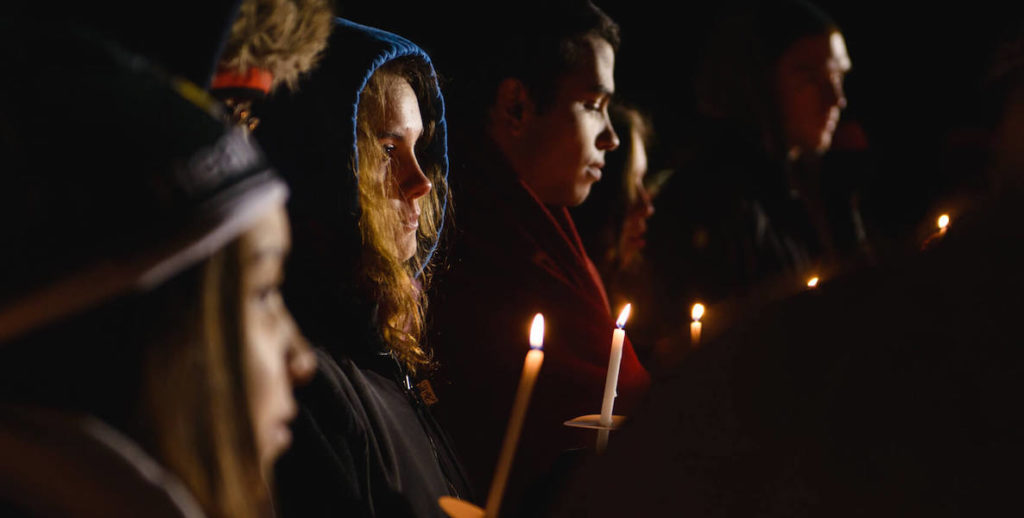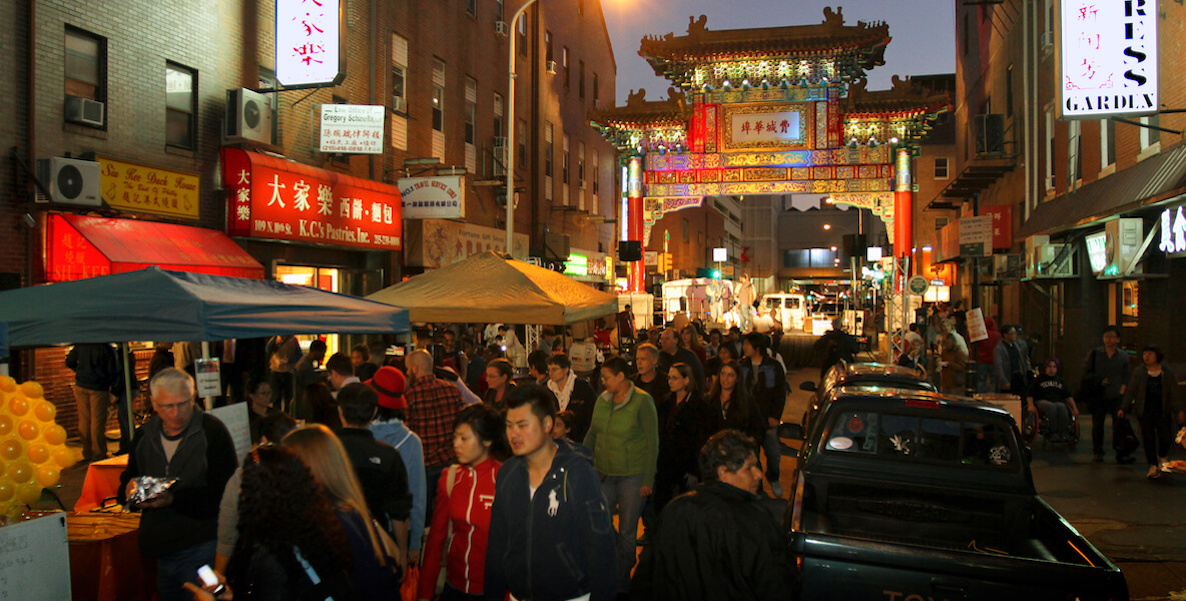On Wednesday evening, the day after a mass shooting in Georgia that killed eight people, including six Asian Americans, around 100 people gathered in Philadelphia’s Chinatown for a vigil to honor and support our neighbors of Asian descent. It was, like all vigils of this sort for the last several years, poignant and sad and enraging.
Here we are again, reflecting on the hate that pervades our society—fueled by those in power,including the former President and the media — inflicted upon those who can least fight back.
Philadelphians of Asian descent are Philadelphians — our neighbors, friends, teachers, doctors, service providers. They are citizens of our city, and they enrich it.
It’s unclear still if the murderer in Georgia was specifically targeting Asian American women. (It is clear that he was targeting women.) But the shooting spree has brought to the forefront something that has been true for the last year-plus, which also led to Congress holding its first hearing about anti-Asian violence in 30 years, yesterday: The rising incidences of anti-Asian harassment and assault since the start of the coronavirus pandemic, including here in Philadelphia, where a survey of 400 Asian residents found that 20 percent had experienced racial harassment or assault in the last year.
We can be better than that — and we should.
Approximately 115,000 people of solely Asian descent live in Philadelphia, making up about 7 percent of all residents. Asians are 39 percent of our city’s immigrant communities (based on census data that’s admittedly few years old now), which together are responsible for the city’s population growth over the last decade, after years of losing residents.
Immigrants are an integral part of our diverse city, both culturally and economically: According to a 2018 Pew report, immigrants account for most of Philly’s labor growth since 2010, and are responsible for many of the small businesses in our neighborhoods. Of those entrepreneurs, Asian Americans are disproportionately represented, owning approximately 11 percent of the city’s small businesses.
More importantly, though, Philadelphians of Asian descent are Philadelphians — our neighbors, friends, teachers, doctors, service providers. They are citizens of our city, and they enrich it.
So what can we do to make these difficult times less difficult for those bearing the brunt of harassment? Here are some — though certainly not all — ideas:

Support organizations supporting Asian American residents in Philly—including some of those that organized Wednesday’s rally: Woori Center, VietLead, Asian Americans United, API PA, Modero & Co, Cambodian Association of Greater Philadelphia, Pejuang, APALA Philadelphia, Red Umbrella Alliance, Asian Arts Initiative and Philadelphia Chinatown Development Corporation.
Support national groups working to support and advocate for Asian and Pacific Islanders, including those on this list.
Intervene. It can be intimidating to be more than a passive bystander — but any help interrupting, documenting or saying something when you see someone being harassed can help. National advocacy group Asian Americans Advancing Justice has a guide to bystander intervention that includes what they call the “5 Ds”: Distract; Delegate; Delay; Direct; and Document.
Support Asian youth, through programs such as Asian Americans United’s Chinese Youth Organizing Project; and VietLead’s Our Roots Youth program.
RELATED FROM THE CITIZEN
A student-led effort for a multi-generational garden in Cambodia Town offers a space where growing food meets cultural preservation
Learn the history. Start with Ronald Takaki’s Strangers From a Different Shore: A History of Asian Americans,” first published in 1989, and historian Erika Lee’s The Making of Asian America from 2015. Both recount the long sweep of America’s relationship to Asian immigrants—invited, banned, imprisoned, integrated. Then move on to Minor Feelings: An Asian American Reckoning, award-winning poet Cathy Park Hong’s debut book of essays on what it means to be Asian in the U.S. today.
Read more by Asian authors, like Charles Yu’s Interior Chinatown, which won the 2020 National Book Award; Viet Thanh Nyun’s 2016 Pulitzer Prize-winning The Sympathizer (and his 2021 follow-up, The Committed); or Kevin Kwan’s Crazy Rich Asians, the frothy novel that inspired the hit movie. (Here’s a list of other recommended books in honor of last May’s Asian American Heritage Month.)
Encourage schools to teach about Asia and Asian Americans in literature classes, social studies and art. Local teacher Ami Patel Hopkins offered a list of resources in Technical.ly, which included this link to a recommended curriculum for Asian American studies.
Report. If you are a victim of harassment or worse, speak up and be counted. You can do that in two places: Email the City’s Commission on Human Relations, and reach out to Stop AAPI Hate, a national advocacy group started last year at San Francisco State University that is tracking cases nationwide. Both are multi-lingual and can offer access to helpful resources.
Be safe and be supportive. Stop AAPI Hate offers some tips for how to deal with racist threats as either a victim or an observer, including seeking help and getting emotional support after an incident. (You can find an Asian American therapist through the Asian Mental Health Collective.)
Support SEAMAAC’s civic engagement work. The South Philly nonprofit not only feeds hundreds of people a week, it has led voter registration drives, community education programs and managed to get more than 90 percent of its clientele to fill out the 2020 census. And now it’s venturing into vaccine distribution in the underserved community in South Philly.
RELATED FROM THE CITIZEN
South Philly’s SEAMAAC has fed thousands of people since last March, while continuing to push the vote and the census
Order in. Chinatown all but shut down for several months in the winter of the pandemic, but there are many, many Asian restaurants in town that deliver incredible food, from Baology to Kalaya and Hardena — not to mention the Chinese restaurants in every neighborhood.
Celebrate Asian Arts and Artists. Take in a performance by Kun-Yan Lin Dancers. Look for the Philadelphia Asian American Film Festival in November. Collect a work by artists who are listed with the Asian Arts Initiative.
Bring “Dumplings Without Hate” to Philly. In the early days of Covid-19, a group of New Yorkers launched a program that brought diners together virtually to learn about issues facing the Asian American community—over a Dim Sum dinner—and allowed people to donate funds to support businesses through Asian Americans for Equity. So far, their GoFundMe has raised $65,000, in mostly small donations, to save New York’s Chinatown.
RELATED FROM THE CITIZEN
Grassroots campaign Dumplings Against Hate raises funds for businesses in New York’s Chinatowns and fights coronavirus-related racism. A local activist hopes to bring it here.
Support Asian-owned businesses — including Asian grocery stores, many of which you can find on this map, and the shops on Seventh Street in South Philly, which launched a Covid-19 program that matches 50 percent of the value of a gift certificate up to $75 purchased online.
Connect with Chinatown Elders. Prolonged isolation is causing a mental health crisis for many older people separated from family, especially those who also experience a language barrier. Asian Arts Initiative and On Lok House have partnered to create “Picture Pals,” connecting seniors with community members through art. All you need to get started is a drawing, a stamp and an envelope. Sign up here.
Join a giving circle. The Asian Mosaic Fund, which has distributed $213,000 in grants to organizations run by Asian Americans and Pacific Islanders, including $40,000 in Covid-19 relief funds last year, is now collecting for its 2021 campaign.
Vote. Always do it, including this spring for the municipal primary. Look for people who represent your values, whatever they look like, and hold them accountable.
Header photo by J.Kaczmarek / Visit Philadelphia

